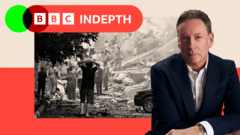As Donald Trump returns to the international stage with bold declarations of peace and safety, experts weigh the impact of his actions on global conflicts, revealing a complex landscape of negotiations and heightened tensions.
**Trump's Claims of Global Safety: A Closer Examination**

**Trump's Claims of Global Safety: A Closer Examination**
Are Trump's promises of peace making the world a safer place?
When Donald Trump was inaugurated as President of the United States for a second term in January, he declared a vision for himself as a "peacemaker" and "unifier." He assured his audience, "My proudest legacy will be that of a peacemaker and unifier." Weeks later, on his inaugural foreign tour through affluent Arab nations, Trump claimed, "I will tell you that the world is a much safer place right now," referring to the potential for stability in Ukraine. However, the query remains: is the self-proclaimed "world's best peacemaker" indeed improving global safety or escalating danger?
The reality in critical conflict zones presents a mixed picture. Although Trump asserts he holds the key to peace with Russian President Vladimir Putin, ongoing attacks from Russia on Ukraine reveal a grim situation. The bombardment has intensified, marking a significant increase in violence. Concurrently, the humanitarian crisis in Gaza escalates, with Red Cross facilities reporting record numbers of weapon-related injuries.
Nevertheless, there are signs of diplomatic progress elsewhere. The United States has reopened nuclear negotiations with Iran, a move aimed at fostering a more beneficial agreement and preventing war. Meanwhile, the lifting of sanctions on Syria, guided by Trump’s alignment with Saudi Arabia, may indicate a shift towards addressing the country’s internal turmoil.
David Harland, head of the Centre for Humanitarian Dialogue, captures the paradox, stating, "It's the worst of times and the best of times." Despite the record number of ongoing wars, many conflicts are finding their way to negotiation tables, giving some hope for resolutions.
Trump's negotiating style, prioritizing immediate results over intricate details, may reflect a broader trend where more international actors are prepared to engage with him. Former national security adviser K.T. McFarland posits that global leaders recognize Trump as a figure they must heed. His motto of "peace through strength" echoes his approach, relying on his assertive dealings to navigate complex international disputes.
However, Trump's attempts to mediate disputes, including the ongoing ramifications of previous ceasefire agreements in Gaza and the war in Ukraine, reveal the challenges of sustaining peace. His straightforward approach lacks the depth needed in prolonged negotiations, with experts like Martin Griffiths noting, "You have to start and you have to stay."
Trump's ambitions have also reshaped international policies, as evidenced by military spending demands from NATO allies, reflecting heightened concerns over global security under his administration. Yet, his focus on immediate transactional deals, such as the proposed security-for-minerals arrangement in the Congo, raises questions about addressing underlying causes of conflict rather than just surface-level resolutions.
As Trump grapples with a slew of crises and frustrations with unyielding global actors, he faces the temptation to withdraw from multifaceted conflicts like Ukraine. The BBC World Service is set to discuss these developments in a special debate titled "Is Donald Trump making the world safer or more dangerous?" airing this Friday, inviting viewers to assess the implications of Trump’s foreign policy in a rapidly evolving international environment.
The reality in critical conflict zones presents a mixed picture. Although Trump asserts he holds the key to peace with Russian President Vladimir Putin, ongoing attacks from Russia on Ukraine reveal a grim situation. The bombardment has intensified, marking a significant increase in violence. Concurrently, the humanitarian crisis in Gaza escalates, with Red Cross facilities reporting record numbers of weapon-related injuries.
Nevertheless, there are signs of diplomatic progress elsewhere. The United States has reopened nuclear negotiations with Iran, a move aimed at fostering a more beneficial agreement and preventing war. Meanwhile, the lifting of sanctions on Syria, guided by Trump’s alignment with Saudi Arabia, may indicate a shift towards addressing the country’s internal turmoil.
David Harland, head of the Centre for Humanitarian Dialogue, captures the paradox, stating, "It's the worst of times and the best of times." Despite the record number of ongoing wars, many conflicts are finding their way to negotiation tables, giving some hope for resolutions.
Trump's negotiating style, prioritizing immediate results over intricate details, may reflect a broader trend where more international actors are prepared to engage with him. Former national security adviser K.T. McFarland posits that global leaders recognize Trump as a figure they must heed. His motto of "peace through strength" echoes his approach, relying on his assertive dealings to navigate complex international disputes.
However, Trump's attempts to mediate disputes, including the ongoing ramifications of previous ceasefire agreements in Gaza and the war in Ukraine, reveal the challenges of sustaining peace. His straightforward approach lacks the depth needed in prolonged negotiations, with experts like Martin Griffiths noting, "You have to start and you have to stay."
Trump's ambitions have also reshaped international policies, as evidenced by military spending demands from NATO allies, reflecting heightened concerns over global security under his administration. Yet, his focus on immediate transactional deals, such as the proposed security-for-minerals arrangement in the Congo, raises questions about addressing underlying causes of conflict rather than just surface-level resolutions.
As Trump grapples with a slew of crises and frustrations with unyielding global actors, he faces the temptation to withdraw from multifaceted conflicts like Ukraine. The BBC World Service is set to discuss these developments in a special debate titled "Is Donald Trump making the world safer or more dangerous?" airing this Friday, inviting viewers to assess the implications of Trump’s foreign policy in a rapidly evolving international environment.



















